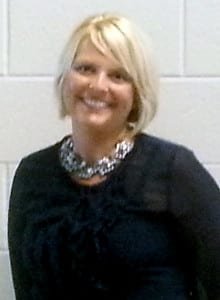 “Kids have to be able to have fun here.”
“Kids have to be able to have fun here.”
And by “here,” Michelle Molargik means school. Edon Elementary School, to be exact. Not a bad mentality for the new principal of said school to have. Not all people share that opinion, however.
“I hear parents talk about how much they hated school all the time.” Molargik admitted, before confessing, “I’d probably still be in school if my husband would let me.”
That would be Joe Molargik, who serves as the Assistant Division Fire Chief of Auburn. Having met at the Auburn YMCA when Michelle was still in high school, the couple has been married for 15 years as of last January.
As for schooling, Michelle’s path to educational administrator had a few twists and turns.
“I took a little detour.”
Indeed, Molargik’s original plan was to become an accountant, doing her coursework at IPFW. This wasn’t her calling, however, and she was destined to continue her education. Not until years later, when her son, Cade, turned three years old, did she consider going back to school. Watching him brought about a revelation for Molargik.
“I discovered I have a love for children.”
That love drove Molargik to return to IPFW, where she earned a Bachelor’s Degree in Education. She went on to continue her academic career by obtaining her Master’s Degree from Ball State University.
From there, Molargik, an Angola native, began her work as an educator at Dekalb Middle School, where she taught second and fifth grade. She then advanced to the role of Associate Principal. After a few years, she felt it was time to seek out a full principal’s position. This search led her to Edon Northwest Schools, where Superintendent Ed Ewers and the Edon Board of Education hired her, a decision for which Molargik is thankful.
What made Edon stand out?
“Edon has a great reputation.” Molargik claimed. “I want to continue that.”
Also citing philosophical similarities, Edon felt like a good fit for Molargik. That philosophy revolves around putting students first.
“You have to be here for students,” Molargik advised, “to make sure their needs are met, and that they can grow.”
How educators go about accomplishing such lofty, yet noble goals has changed over the years, as Molargik can attest.
“Their brains are wired differently.”
With changes in technology and the invention of social media, the modern child has become more hands on, more active in receiving information. Simply sitting down and getting lectured from a text book for an hour at a time has been rendered an ineffective teaching style in today’s classrooms.
Schools have therefore sought out new and creative tactics to educate their students. One of said tactics employed by Edon is a concept known as mini-lessons. Molargik explains.
“They have different opportunities to learn, based on learning style.”
This educational diversity is achieved in 15 minute intervals, with students rotating to different portions of the classroom after each one. Each “center,” as Molargik refers to them, is focused on a different teaching method reinforcing the same lessons and skills. The idea is that at least one of these centers will reach out to each child, thus ensuring they understand what they’re being taught.
Such understanding shouldn’t be limited to just students, though. Molargik would like to get the community more involved in the goings on of the school. In particular, making parents more aware of what goes on in their child’s classes.
“I think it’s important that they have an understanding of what happens within these walls.” Molargik said of parents.
What happens within those walls is always changing, adding to the challenge of reaching young minds. The State of Ohio uses the Common Core Standards to teach and evaluate its students. Common Core is a controversial issue, as it’s largely unpopular with educators and parents alike. Yet Molargik has a different viewpoint on the Standards.
“It’s important to know students have the same learning standards.”
With an background rooted solely in Indiana, where no across-the-board standards exist, seeing the state regard all students equally is a refreshing change.
That’s a secondary concern, however, as educating and inspiring students takes first priority for Molargik.
“I want to be able to grow that appetite to learn.”
Which Molargik and her staff should have no problem doing. Because few things make kids hungrier than fun.



